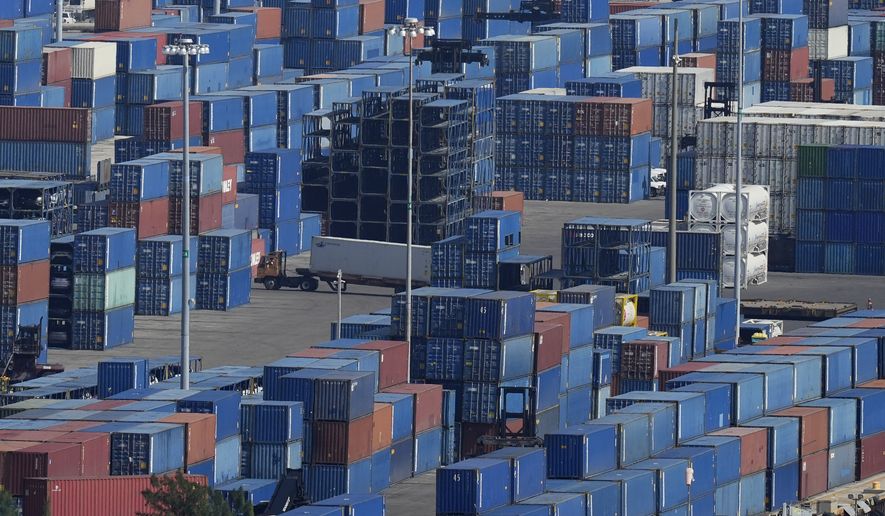The economy slowed to 2.0% growth in the third quarter, marking a sharp slowdown as the delta variant of the coronavirus and supply chain shortages curtailed growth, the Commerce Department reported Thursday.
Declines in automobile sales and home building led the drop in growth, the weakest quarterly performance since the recovery from the pandemic recession began last year. Shortages of computer chips, construction material and appliances all hampered the recovery.
The report also intensified Republicans’ accusations that President Biden is bungling the recovery through over-regulation and plans for massive spending increases. It was released just as the president was announcing a $1.75 trillion framework on his spending priorities, after protracted negotiations with congressional Democrats.
The plan includes major tax increases and still faces an uncertain fate in Congress.
“Rising prices, supply chain disruptions, a shortage of willing workers, and uncertainty around Democrats’ tax and spend proposals are all weighing heavily on America’s households and businesses,” said Sen. Mike Lee of Utah, top Republican on the Joint Economic Committee. “Now is not the time to impose new taxes, regulations, mandates, or subsidies that would make work less attractive and weaken our recovery.”
Mr. Biden called the new framework, which includes expanded child tax credits and greater health-care subsidies, “a fundamental game-changer for families and for our economy.”
“Seventeen Nobel Prize winners in economics have said it will lower the inflationary pressure on the economy,” the president said.
Many economists expect the economy to pick up through the end of the year as COVID-19 cases continue to fall. White House officials point out that new cases of the delta variant are down nearly 60% since the peak of the surge. Also, jobless claims have been declining for about a month, dropping last week to a new pandemic low in a separate report from the Department of Labor.
The tepid growth report arrived as rising prices, especially for gasoline, food, rent and other staples, impose an increasing burden on American consumers and erode the benefits of higher wages.
Inflation has emerged as a threat to the economic recovery and a key concern for the Federal Reserve as it prepares to start withdrawing the emergency aid that it provided to the economy after the recession struck last year. The economy grew by more than 6% in each of the previous two quarters.
Consumer spending in the July-to-September period slowed to an annual rate of 1.6%, plunging from a rate of 12% in the second quarter.
Thursday’s report from the government was the first of three estimates of last quarter’s gross domestic product or GDP, which is the sum of all goods and services produced within the nation’s borders. It showed widespread weakness last quarter.
In consumer spending, purchases of durable goods, like autos and appliances, fell at a 26.2% rate. Sales of clothing and other nondurable goods slowed to a modest annual gain of 2.6%. And purchases of services rose at a 7.9% rate, down from an 11.5% annual rise in the previous quarter.
Businesses, too, held back. Corporate investment in equipment and plants slowed to a 1.8% rate of growth, after a 9.2% annual increase in the April-June quarter. Residential construction declined at a 7.7% rate after an even sharper 11.7% drop in the previous quarter.
Conservatives blamed the Biden administration’s policies for the slowdown.
Rep. Kevin Brady of Texas, the top Republican on the tax-writing Ways and Means Committee, called it an “awful report” and said it’s “more proof that President Biden is bungling the recovery.”
“Economic growth has already peaked for President Biden’s presidency, and now he’s nearly a million jobs short of his promises,” Mr. Brady said. “He’s making an alarming labor shortage worse for Main Street businesses, and is demanding more government stimulus that will drive prices up higher and longer.”
Economist Steve Moore, who was an adviser to former President Donald Trump, called the report “the latest evidence that Joe Biden’s policies of big government socialism have crash-landed the economy.”
“We now have stagflation — the killer combination of high inflation and low growth — which led to the downfall of Jimmy Carter,” he said. “His anti-work, anti-growth and anti-America energy policies have largely shut off this recovery’s engines and we’re in a crisis. These figures show Biden’s policies are hurting low-income Americans the most.
He said of the proposed new spending by the White House, “The worst thing to do now is pass Biden’s $5 trillion spending, taxing and borrowing scheme that will only make inflation and the supply chain crisis much worse. Kill the bill.”
• This story is based in part on wire service reports.
• Dave Boyer can be reached at dboyer@washingtontimes.com.




Please read our comment policy before commenting.